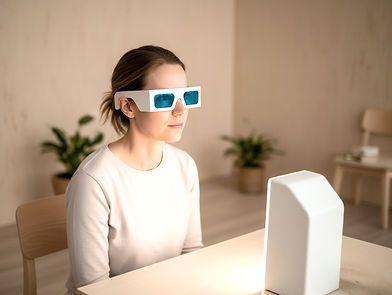
NEURO-OPTOMETRIC REHABILITATION
We provide personalized treatment for individuals facing visual deficits due to traumatic brain injuries or concussion. Our team works closely with patients to address visual, processing, and motor disorders while integrating the vestibular system through a variety of treatment options, including specialized lenses, prisms, tints, and vision rehabilitation.
It's important to recognize that visual problems can often be overlooked during initial brain injury treatment, making a comprehensive vision assessment essential. Trust our Neuro-Optometric Rehabilitation Optometrists to help you regain your visual function and improve your quality of life.
What is Neuro-Optometric Rehabilitation?
Visual problems may occur following an acquired brain injury, including a concussion or traumatic brain injury (TBI). This may include acquired strabismus (eye turn), binocular dysfunction, convergence and/or accommodation paresis/paralysis, oculomotor dysfunction, visual-spatial dysfunction, visual processing and cognitive deficits. Neuro-Optometric Vision Rehabilitation is an individualized treatment regimen determined by standardized diagnostic criteria for patients with such visual deficits.
Left untreated, visual system disorders can have serious consequences, such as the inability to organize and make sense of visual information along with poor depth perception and difficulties concerning balance and posture.
Would Neuro-Optometric Rehabilitation Help Me?
There are common physical and performance signs to look for when considering whether you or your loved one would benefit from Neuro-Optometric Rehabilitation.
Common Visual Problems after TBIs
-
Eye focusing – Blurred vision or compromised ability to shift focus
-
Eye teaming – Eyes may not work together properly even to the point of double vision
-
Eye movements – Difficulty with eye movements when reading or trying to follow a moving object
-
Motion sensitivity – Integration between the vision and balance system can be disrupted, leading to discomfort and dizziness when scrolling on a screen or phone, or when in busy environments such as grocery stores, social settings, or sporting events

Other Visual Symptoms
-
Double Vision – Seeing multiple images when looking close, far, or both due to difficulties with eye teaming
-
Eye Pain and Headaches – Discomfort such as dull ache, stabbing pain, or even redness, burning or itching around the eye, or headaches can be long-lasting, even past one year from injury
-
Sensitivity to Light - Brain injury is often accompanied by increased light sensitivity and general inability to tolerate glare
-
Visual Field Loss – Partial or complete vision loss can also occur after a head trauma, causing one to bump into objects, or experience sudden falls

The Visual-Vestibular Connection
-
Vision plays a significant role in our ability to balance, orient ourselves in space, and process movement of objects in our environment.
-
Approximately 25% of the visual nerve system interacts with the vestibular system that helps control balance and eye movements.
-
Balancing problems related to vision dysfunctions due to concussions, stroke or other neurological deficits may experience: Vertigo and dizziness, imbalance and spatial disorientation, vision disturbances.

Syntonics: Restoring Balance After Traumatic Brain Injury
At the Pediatric Vision Development Center, we may use Syntonics (Optometric Phototherapy) as a non-invasive treatment for visual system balance issues following a Traumatic Brain Injury (TBI).
Utilizing specific wavelengths of colored light to stimulate the visual system, Syntonics is a therapeutic approach rooted in decades of practice, dating back to the 1940s. The light stimulation connects to the brain's regulatory centers—like the hypothalamus and pituitary gland—to positively influence and balance the autonomic nervous system (ANS).
By applying precise colors for set durations, Syntonics aims to re-balance the sympathetic and parasympathetic systems, which are often dysregulated after a traumatic brain injury. It serves as an adjunctive component within a larger, prescribed vision rehabilitation program, not a standalone service.
How Syntonics Works
Core Principle
Syntonic Optometry (or Syntonics) is a discipline centered on the idea that different people respond differently to the same environmental stimuli. Its main focus isn't on color perception (what we see), but on the energetic and physiological impacts that specific electromagnetic frequencies (colors) have on a person's biological systems and behavior. For example, just as light drives photosynthesis in plants or influences melatonin for sleep, and blue-green light treats infant jaundice, specific light frequencies can also modulate human biology and function.
Application
Consequently, the specific colored filter chosen for an individual patient is selected to produce definite, targeted reactions based on that patient's diagnosis and specific needs.
During a Syntonics session, a patient looks through different colored filters for a specific amount of time. The colored light stimulates the retinal-hypothalamic pathway, which connects the retina to the hypothalamus (the control center for the nervous and endocrine systems). This stimulation helps to:
BALANCE THE ANS
Balance the autonomic nervous system (ANS), restoring flexibility between the parasympathetic and sympathetic systems. This leads to improvements in mood, energy, and the cognitive resources available for learning.
IMPROVE CONNECTION
Improve the flow throughout the visual system, restoring optimal neural communication within the brain's visual pathways, taking the visual system from a dysregulated state to one that is stable and responsive.
REESTABLISH FUNCTION
Reestablish normal function in the visual-cognitive process by helping synchronize the timing of the neural signals, enhancing focus and sustained attention, and reducing the "noise" or stress signals that distract the brain.


